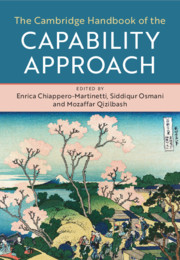Book contents
- The Cambridge Handbook of the Capability Approach
- The Cambridge Handbook of the Capability Approach
- Copyright page
- Dedication
- Contents
- Figures
- Tables
- Contributors
- Foreword
- Acknowledgements
- General Introduction
- Part I Historical Antecedents and Philosophical Debates
- Introduction to Part I
- 1 The Capabilities Approach and the History of Philosophy
- 2 Karl Marx and the Capabilities Approach
- 3 Utility and Capability
- 4 Intellectual History and Defending the Capabilities Approach
- 5 Sen, Smith and the Cambridge Tradition
- 6 The Capability Approach to Well-Being and Freedom from the Viewpoint of Welfare Economics and Social Choice Theory
- 7 Resources or Capabilities?
- 8 Taking Multidimensionality Seriously
- 9 The Capabilities Approach and Political Liberalism
- 10 Selecting a List
- 11 Individualism and the Capability Approach
- 12 The Politics of Wonder
- Part II Methods, Measurement and Empirical Evidence
- Part III Issues in Public Policy
- Index
- References
3 - Utility and Capability
J. S. Mill and Amartya Sen
from Part I - Historical Antecedents and Philosophical Debates
Published online by Cambridge University Press: 11 November 2020
- The Cambridge Handbook of the Capability Approach
- The Cambridge Handbook of the Capability Approach
- Copyright page
- Dedication
- Contents
- Figures
- Tables
- Contributors
- Foreword
- Acknowledgements
- General Introduction
- Part I Historical Antecedents and Philosophical Debates
- Introduction to Part I
- 1 The Capabilities Approach and the History of Philosophy
- 2 Karl Marx and the Capabilities Approach
- 3 Utility and Capability
- 4 Intellectual History and Defending the Capabilities Approach
- 5 Sen, Smith and the Cambridge Tradition
- 6 The Capability Approach to Well-Being and Freedom from the Viewpoint of Welfare Economics and Social Choice Theory
- 7 Resources or Capabilities?
- 8 Taking Multidimensionality Seriously
- 9 The Capabilities Approach and Political Liberalism
- 10 Selecting a List
- 11 Individualism and the Capability Approach
- 12 The Politics of Wonder
- Part II Methods, Measurement and Empirical Evidence
- Part III Issues in Public Policy
- Index
- References
Summary
When Amartya Sen defends his capability approach to well-being, he contrasts it with the utility theory advocated by the classical utilitarians, including John Stuart Mill. Yet a closer examination of the two views reveals that they are much more similar than they appear. Each can be interpreted in either a subjective or an objective way. When both are interpreted subjectively the differences between them are slight, and likewise for the objective interpretations. Finally, whatever differences may remain are less important than they might seem, since the two theories are developed by Sen and Mill for different purposes and, in that sense, are not genuine alternatives.
- Type
- Chapter
- Information
- The Cambridge Handbook of the Capability Approach , pp. 59 - 75Publisher: Cambridge University PressPrint publication year: 2020



